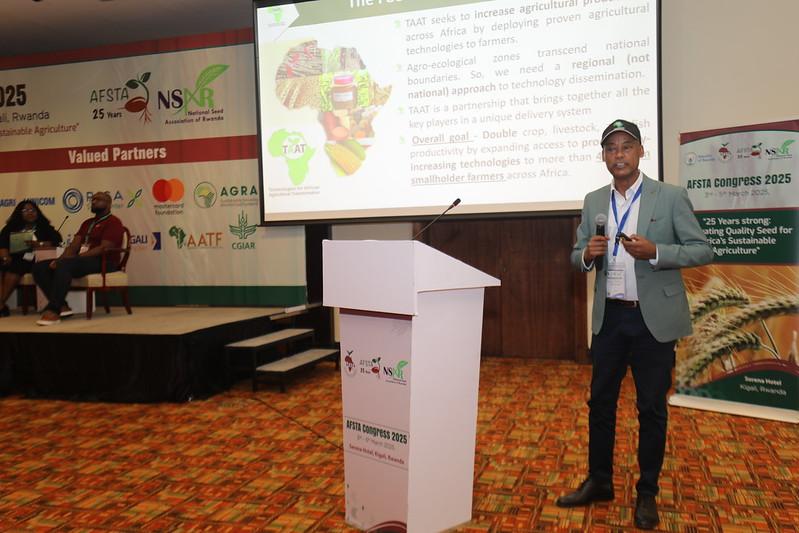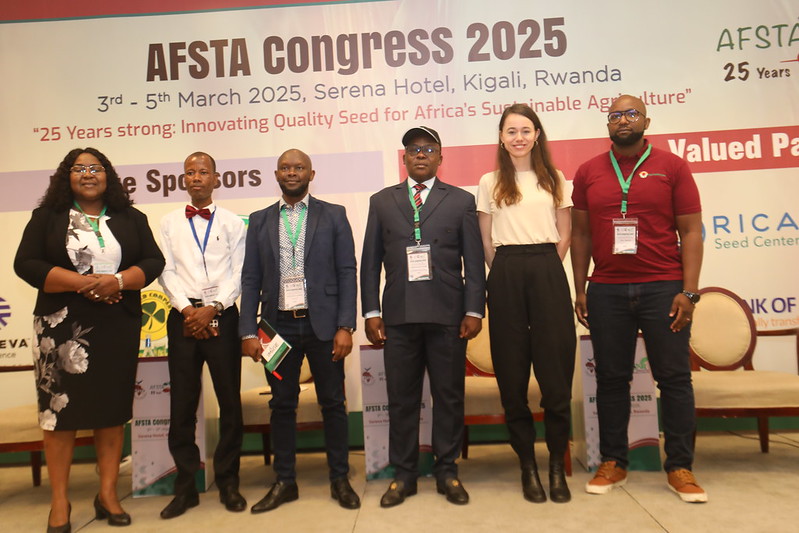
By Deborah Olaoluwa
Technologies for African Agricultural Transformation (TAAT) has highlighted the imperatives of adopting innovative partnership models to drive the profitability of small and medium-scale enterprises (SMEs) in the seed sector.
Head of the TAAT Clearinghouse, Dr Solomon Gizaw, made this known at the ongoing 25th African Seed Trade Association’s (AFSTA) Annual Congress in Kigali, Rwanda.
The congress, which holds from March 3rd to 6th, 2025, comprises nearly 300 delegates representing the global seed sector in attendance. Hon. Eric Rwigamba, Rwanda’s Minister of State for Agriculture and Animal Resources, declared it open.
ACLBC, a game-changer for SMEs
Speaking on the topic “Scaling technologies and innovation in the seed system and how public-private partnerships can unlock opportunities for seed SMEs: Breeding Consortium business cases”, Dr Gizaw identified the African Cereal and Legume Breeding Consortium (ACLBC) as a partnership-driven model to strengthen the capacity of seed companies in hands-on seed production with an emphasis on hybrids and conduct joint demonstrations to showcase high-performing TAAT-vetted varieties.
Calling on SMEs in the seed sector to join ACLBC, Dr Assefa affirmed that membership of the consortium will grant SMEs access to high-yielding and path-breaking varieties and breeding lines, assist them in developing their breeding lines, and provide technical assistance in conducting multi-location adaptability tests of new varieties.
“The ACBLC strengthens the capacity of seed SMEs in hands-on seed production with an emphasis on hybrids and conducts joint demonstrations to showcase high-performing TAAT-vetted varieties,” he added.
Established by the African Seed Trade Association (AFSTA) and the International Institute of Tropical Agriculture (IITA) through Technologies for African Agricultural Transformation (TAAT), a flagship programme of the African Development Bank (AfDB), the African Cereal and Legume Breeding Consortium (ACLBC) accelerates the adoption and scaling of high-performance seed technologies generated by national and international research institutions.

Transforming Africa into a dynamic seed trade hub
The AFSTA annual congress brings together leading seed traders and producers, traditionally covering a broad range of topics in the seed value chain. This year, Congress, apart from celebrating AFSTA’s 25 years of existence, is focusing on discussions around future trends and vision for transforming Africa into a dynamic seed trade hub for sustainable growth in the agricultural sector and enhanced food security.
The congress will equally deliberate on the state and future of plant breeding innovation in Africa; the state of plant variety protection systems in Africa, as well as how to better position the continent in the global seed industry.
“The 2025 Annual General Meeting of AFSTA represents a pivotal transition, where we will adopt a new strategic plan under the leadership of our newly appointed Secretary General, Dr Yacouba Diallo,” says Mr Amadou Sarr, President of AFSTA.
He added that the new strategic plan will be a vital tool for promoting market access and trade, fostering industry innovation, developing partnerships, and advocating for supportive policies and regulations. “Furthermore, the plan aims to enhance the services we provide to our members and ensure the sustainability of our Association,” Mr Sarr said.
Fostering growth amidst challenges
The AFSTA’s Secretary General, Dr Yacouba Diallo, averred that the congress in Kigali provides a great opportunity to discuss and agree on how best to drive the dynamic seed sector that the African seed industry is known for, amidst the background of a fascinating mix of challenges and opportunities.
“Like many other industries, the seed business in Africa has changed over time. These changes stem from climate change, new farming techniques and technologies, seed market demands, finance, investments and human skills matters, agricultural policies and regulations”, he says.
For seed industry players in Rwanda, the 2025 AFSTA Congress in Kigali is an opportunity to reflect on collective and national steps to advance and foster growth in the seed sector while also integrating technical and institutional collaborations and innovations.
Innocent Namuhoranye, the Chairperson of the National Seed Association of Rwanda, has said that it is good that the AFSTA Congress 2025 comes to Kigali at a time when the Rwandan Government’s efforts are geared towards shifting from being a market actor in the seed sector to a market enabler, emphasising the private sector’s role in the seed industry.
“Through public-private partnerships and collaborations with the National Seed Association of Rwanda (NSAR), efforts are focused on improving seed quality and accessibility,” Mr Namuhoranye says.
Several representatives of regional and international organisations are participating in the congress. They include the International Seed Federation (ISF), the International Seed Testing Association (ISTA), Union for the Protection of New Plant Varieties (UPOV), the Organization for Economic Cooperation and Development (OECD), Common Market for East and Southern Africa (COMESA), West and Central African Council For Agricultural Research and Development (CORAF), International Institute of Tropical Agriculture (IITA), the African Union, the African Regional Intellectual Property Organisation (ARIPO), Euroseeds, the African Agricultural Technology Foundation and World Vegetable Centre.













